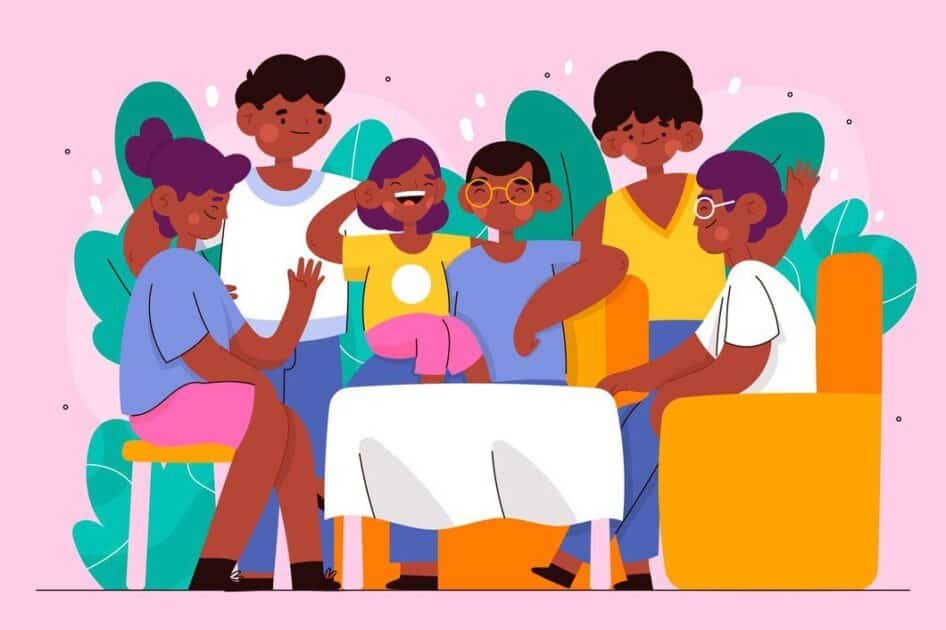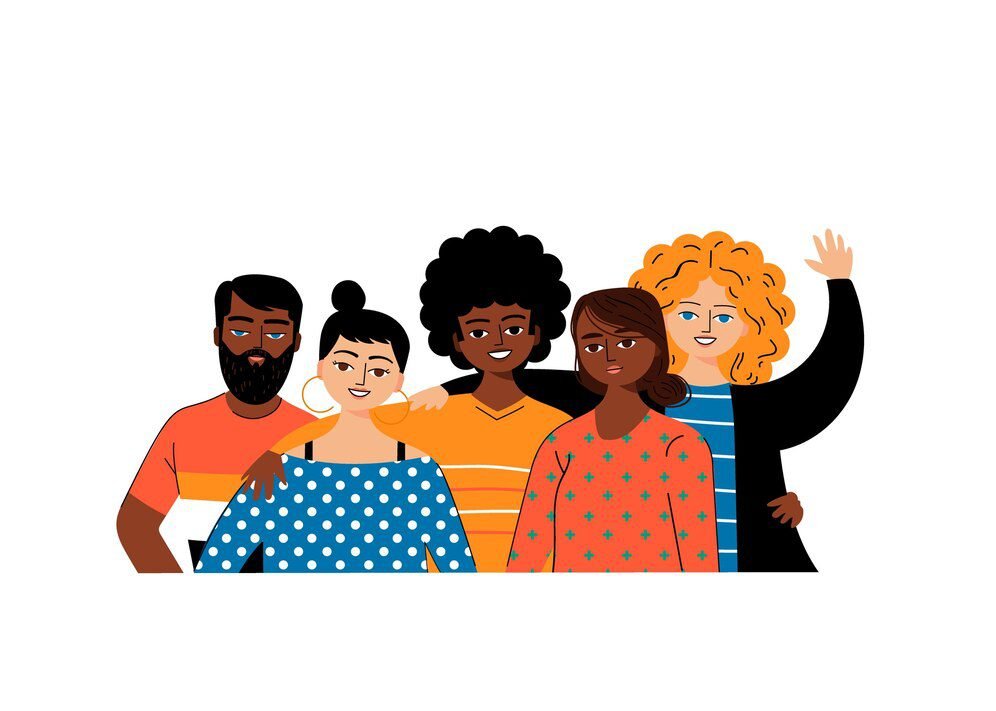No man is an island. Or better yet, a person is a person through other persons.
We need other people to learn and grow. This is basically the concept of Ubuntu.
Ubuntu means I am only because you are. The word, coined from the South African tribes of Xhosa and Zulu, has its roots and concept all over Africa.
In Malawi, it is uMunthu, the idea that you are not better than a wild animal. And in Tanzania, it is utu, the concept that your action should be for the benefit of the community.
In her book, Everyday Ubuntu, Mungi Ngomane shares 14 insightful lessons on what the African Ubuntu philosopy entails and how we can practice it. This article merely summarizes her ideas, her work.
I have added a link to the book below. It’s a real gem.
1. See Yourself in Other People
Perhaps the most important lesson of Ubuntu is that we should see ourselves in other people. We should be able to look at them and see ourselves reflected back.
Besides our parents who sire and raise us, we have teachers who show us how to read and write, mentors who guide us through our careers, and lovers who teach us emotional lessons, both good and bad.
While the Western culture tells us that it is a badge of honor to be self-made, Ubuntu is the total opposite of it.
It credits our growth to the thousands– if not hundreds of relationships, big and small, that have nurtured us along the way.
The stranger who offers you a seat on the train, the mechanic who fixes your car, and the barista who lets it slide when you are a few pennies short for your coffee.
All these actions, though insignificant, make a difference in our day.
2. There is Strength in Unity
We are far more united and have far more in common than that which divides us
– Jo Cox
It is easy to underestimate the power of the masses until you look at political revolutions.
The infamous salt march by Mahatma Gandhi was the first among many non-violent protests that eventually led to India’s freedom from colonial rule.
Martin Luther King Jr. made his famous ‘I have a dream’ speech in front of hundreds of thousands of protestors.
In short, there is power in many. That is why it’s easier to reach our destination or goal if we join forces with those around us. This is what Ubuntu tells us.
Human beings are naturally meant to live together, not to isolate. Explore, and you’ll be pleasantly surprised at how much others can help you.
3. Put Yourself in Other People’s Shoes
When someone wrongs you, instead of judging or castigating them, first put yourself in their shoes. Try to see things from their point of view.
It’s easier said than done. But to practice Ubuntu, we have to drop our judgments and embrace compassion and understanding. Only then can we understand others.
Everyone’s fighting a battle that we know nothing about. By being kind and taking time to question, we get to walk in their shoes. We get to see things from their perspective. And maybe we may learn that they are not wrong.
Four plus eight equals twelve, but so does six plus six.
4. Dignity For Yourself, Respect For Others

Another core principle of Ubuntu is respect, for both yourself and others.
It teaches us that we should believe in other people, regardless of who they are and what their role is. Everyone is the same and deserving of our respect. We don’t pick and choose the people whom we show it.
But you can’t pour from an empty cup. So, before helping others, self-evaluate first. Create respectful boundaries so you can look after yourself and continue to give to others.
Self-respect is intertwined with respect for others. Remember, we are people through other people.
5. Hope Over Optimism
Hope is being able to see that there is light despite all of the darkness
-Archbishop Desmond Tutu
Hope means having trust and faith, not necessarily of the religious kind. It’s an energy that forms within, and that prevents us from giving up.
Optimism is a feeling. But as we know, feelings come and go. It is based on circumstances and can easily change into pessimism when the going gets tough.
Ubuntu tells us that even when we are suffering, we are still human and still deserving of light. When life tests you, at times beyond your resolve:
- Accept the situation. It’s the way you are feeling, so honor it. Being honest about your feelings helps identify why you feel hopeless.
- Take action. Instead of wallowing, say out loud phrases like ‘I can,’ ‘I won’t give up,’ and ‘I’ll try again.’ These send a powerful message to your subconscious.
- Live in the present. Take a long brisk walk, call a friend, eat wholesome food– do whatever it takes to make yourself feel better physically. Worry less and focus on the present.
- Write a gratitude list. We all have something to be grateful for. Now is the time to examine the good stuff. It may be your physical health, your friends, family. Name all the things you feel good about.
- Set goals. Set goals and put in the work to achieve them. Begin small with gradual increments.
- Find your faith. Not necessarily religious faith. But have faith in something you can trust. It could be faith in your abilities or choices or in going for a daily run to improve your mental health.
6. The F-Word, Forgiveness
The weak can never forgive. Forgiveness is an attribute of the strong
-Mahatma Gandhi
Ubuntu tells us forgiveness brings back our self-respect and dignity.
Maya Angelou says bitterness is like cancer, it eats upon the host. Replaying in our minds the feeling or incident that hurt us, tortures us and taps us into bitterness.
Forgive yourself first, then work towards forgiving others. It takes time, and that’s okay. It doesn’t matter whether your forgiveness is a one-way or two-way street, keep going.
Focus on the good feelings and constantly remind yourself that you’ve chosen this path.
But just because you forgive doesn’t mean you shouldn’t set respectful boundaries.
7. Acknowledge Reality (However Painful)
The first step in making progress is accepting your current situation.
Denying the reality and refusing to confront whatever issues you are dealing with makes you get caught up in a loop.
Ubuntu tells us to accept all facets of life: the good, the bad, and the ugly. And while that happens, the reality is that we are in this together. Look to others for support.
Speak your truth about your reality to others and see how they can help.
8. Embrace Diversity

7 continents, 200+ countries, 8 billion people, and 6500+ spoken languages. You’ve got to admit, our planet is a unique one. If there’s one thing we all have in common, it’s diversity.
But instead of striking fear in us, these national and societal differences should remind us that we are all human beings in this together.
It’s easy to judge food you’ve never tried before, music you are not used to, or a religious belief you don’t understand. Because judging is often based on the unknown. But just because we do things differently doesn’t mean it’s wrong.
9. Little Things Make a Big Difference
It’s easy to feel that your small contribution won’t make a difference, at least not one that really matters.
I mean, why bother voting when someone else will? Why recycle that piece of rubbish when there is litter in the street? Will showing up to that popular event even matter?
Ubuntu teaches us that whatever we give, we’ll receive. The small acts of kindness in our everyday lives are a way of spreading the message of Ubuntu.
Ubuntu is about putting other people’s needs first without expecting anything in return. We see other people before we see ourselves.
Be the change you wish to see in the world. You never know what might happen until you try.
10. Listen So That You Can Hear
It’s easy to say, ‘I didn’t hear that,’ when what we mean is ‘I understand that.’ In order to hear people, you must first learn to listen.
Mental health issues, self-harm, and suicide all stem from the burden of not being able to express yourself and be heard. Often because it’s not safe to do so or because no one is listening.
In Ubuntu, good communication is the basis of making connections. By listening more, we can learn more, be more compassionate, and be less likely to judge.
Opening our minds, hearts, and ears helps us to see others in ourselves.
Everyday Ubuntu
What a better world do we live in when we practice Ubuntu. When we embrace diversity, respect others, and see ourselves in other people.
Ubuntu is a journey, and a difficult one for that matter. It’s not always linear, and we will fail on some days. But with it in our hearts and in our lives, every day is an opportunity to start new.
May Ubuntu bring joy, purpose, and satisfaction into your life.




